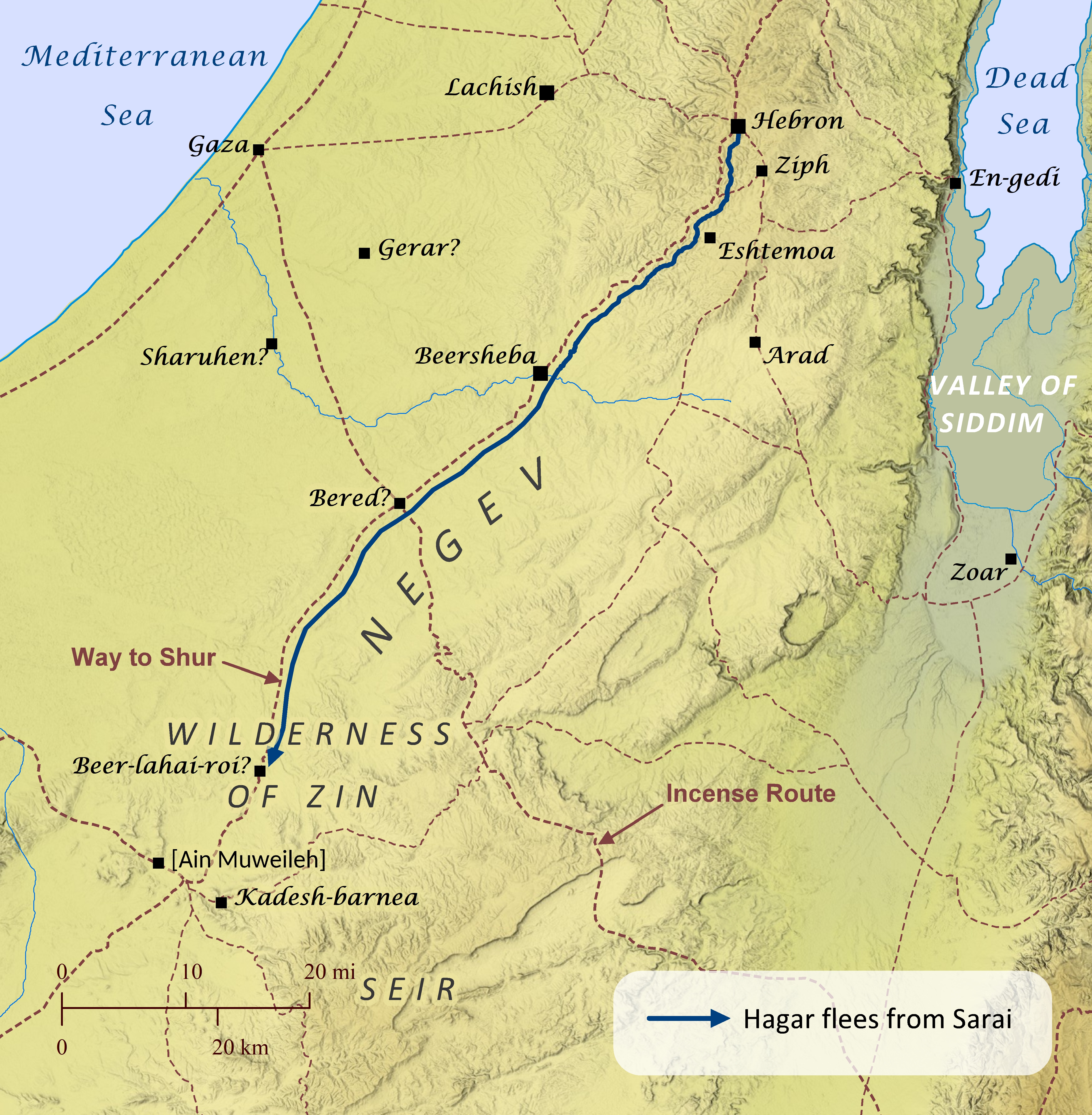Readers’ Version
Literal Version
16:1 Hagar and her son Yishma’el
16 Now Abram’s wife Sarai hadn’t been able to give him any children, but she had an Egyptian slave named Hagar, 2 so Sarai said to Abram, “Listen, Yahweh has prevented me from having children so please sleep with my slave. Perhaps I can have a family through her.” Abram agreed to what Sarai had suggested. 3 So Sarai, the wife of Abram, took Hagar, her Egyptian slave, after Abram had lived ten years in the land of Canaan, and gave her to Abram her husband as a wife for him. 4 So he slept with Hagar and she got pregnant, but once she realised that she began to despise her mistress.
5 So Sarai complained to Abram, “This is all your fault. I let you sleep with my slave, but now that she’s pregnant she looks down on me. May Yahweh judge between me and you.”
6 “Listen,” Abram replied, “She’s your slave to do what she’s told. Do whatever you think best.” So Sarai started mistreating Hagar, and so she ran away.
7 Then Yahweh’s messenger found her in the wilderness at a spring—the spring beside the road to Shur, 8 and asked her, “Hagar, Sarai’s slave, where have you come from and where are you going?”
“I am running away from Sarai, my mistress,” she replied.
9 Then Yahweh’s messenger instructed her, “Return to your mistress and do whatever she tells you,” 10 then added, “I’ll give you so many descendants that they won’t even be able to be counted because there’ll be so many.” 11 Then the messenger told her,
“Listen here: you’re pregnant and will give birth to a son,
and you’ll name him ‘Yishma’el’ (which means ‘God hears’)
because Yahweh has heard your cries of misery.
12 He’ll be a wild donkey of a man
and he’ll be hostile to everyone
and everyone will be against him.
He’ll live right in front of his brothers.”
13 Then Hagar realised that it was Yahweh who had spoken to her and said, “You’re ‘The God who sees me’,” because she thought, “Did I really just see the back of the God who sees me?” 14 So that’s why that well between Kadesh and Bered is now called ‘The well of the living one who sees me’.
15 Then Hagar gave birth to a son for Abram, and Abram named him Yishma’el.[ref] 16 Abram was eighty-six years old when Hagar bore Yishma’el for him.
2 And_ Sarai _she/it_said to ʼAⱱrām here please prevented_me YHWH from_bearing_children go please into servant_of_my perhaps I_will_be_built_up from_her/it[fn] and_ ʼAⱱrām _he/it_listened to_sound/voice of_Sarai.
3 And_ Sarai _she/it_took the_wife_of ʼAⱱrām DOM Hāgār the_from_Miʦrayim/(Miʦrayim) servant_of_her from_the_end/extremity ten years to_ of_ʼAⱱrām _lived in_land of_Kinaˊan/(Canaan) and_she/it_gave DOM_her/it to_ʼAⱱrām her/its_husband/man to_him/it to/for_(a)_woman.
4 And_went_in into Hāgār and_she/it_conceived/became_pregnant and_she/it_saw if/because_that she_had_conceived mistress_of_her and_became_contemptible in/on/at/with_eyes_of_her.
5 And_ Sarai _she/it_said to ʼAⱱrām wrong_of_me upon_you I I_put servant_of_my in/on/at/with_arms_of_your and_she/it_saw if/because_that she_had_conceived and_became_contemptible in/on/at/with_sight_of_she YHWH may_he_judge between_me and_between_you.
[fn] 6 and_ ʼAⱱrām _he/it_said to Sarai there servant_of_your in/on/at/with_power_of_your do to/for_her/it the_please in/on/at/with_eyes_of_you and_mistreated_her Sarai and_fled from_presence_of_her.
7 And_found_her the_messenger_of YHWH at the_spring_of the_waters in/on/at/with_wilderness at the_spring in/on/at/with_way_of Shūr.
8 And_said Oh_Hāgār the_maidservant_of Sarai where from_there have_you_come and_where are_you_going and_she/it_said from_face/in_front_of Sarai mistress_of_my I am_fleeing.
9 And_he/it_said to/for_her/it the_messenger_of YHWH return to mistress_of_your and_submit under authority_of_her.
10 And_he/it_said to/for_her/it the_messenger_of YHWH greatly_(increase) I_will_increase DOM offspring_of_your and_not it_will_be_counted for_many.
11 And_he/it_said to/for_her/it the_messenger_of YHWH see_you are_pregnant and_have a_son and_call his/its_name Yishmāˊʼēl/(Ishmael) if/because YHWH he_has_listened to affliction_of_your.
12 And_he he_will_be a_wild_donkey_of a_man his/its_hand in/on/at/with_everyone and_hand_of everyone in/on/over_him/it and_in the_face_of all_of brothers_of_his he_will_dwell.
13 And_she/it_called/named the_name_of YHWH the_spoke to_her/it you are_a_god_of seeing if/because she_said really here have_I_seen the_back(s) sees_of_me.
14 On/upon/above/on_account_of//he/it_went_in yes/correct/thus/so someone_called to_the_well Bəʼēr Lahai Roi there it_is_between Qādēsh and_between Bered.
15 And_ Hāgār _she/it_gave_birth for_ʼAⱱrām a_son and_ ʼAⱱrām _he/it_called the_name_of his/its_son whom Hāgār she_had_borne Yishmāˊʼēl/(Ishmael).
16 And_Avram was_a_son_of eighty year[s] and_six years in/on/at/with_bore Hāgār DOM Yishmāˊʼēl/(Ishmael) to_ʼAⱱrām.
16:2 OSHB note: We read one or more vowels in L differently from BHS.
16:5 OSHB note: Puncta extraordinaria a ◌ׄ is used to mark such marks in the text when they are above the line and a ◌ׅ when they are below the line.

